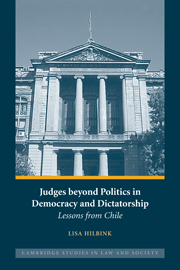Book contents
- Frontmatter
- Contents
- Acknowledgments
- Introduction
- 1 The Judiciary, the Rule of Law, and Democracy: Aspirations and Impediments
- 2 The Institutional Construction of the Judicial Role in Chile
- 3 Conservative Activism in the Heyday of Democracy, 1964–1973
- 4 Legitimizing Authoritarianism, 1973–1990
- 5 Continuity and Change after the Return to Democracy, 1990–2000
- 6 Conclusions and Implications
- Appendix A Orienting Information on Chilean Law and Courts
- Appendix B List of Interviewees (alphabetical by category)
- References
- Index
Introduction
Published online by Cambridge University Press: 08 January 2010
- Frontmatter
- Contents
- Acknowledgments
- Introduction
- 1 The Judiciary, the Rule of Law, and Democracy: Aspirations and Impediments
- 2 The Institutional Construction of the Judicial Role in Chile
- 3 Conservative Activism in the Heyday of Democracy, 1964–1973
- 4 Legitimizing Authoritarianism, 1973–1990
- 5 Continuity and Change after the Return to Democracy, 1990–2000
- 6 Conclusions and Implications
- Appendix A Orienting Information on Chilean Law and Courts
- Appendix B List of Interviewees (alphabetical by category)
- References
- Index
Summary
On September 11, 1973, General Augusto Pinochet helped to lead the overthrow of one of Latin America's most celebrated democratic regimes. As part of the coup, Chile's military leaders bombed the presidential palace, shut down the Congress, closed or banned political parties, and purged the state bureaucracy. They left the courts, however, completely untouched. In the face of state terror, Chilean human rights defenders thus placed their hopes in the judiciary as the only branch of the democratic state left intact.
To the dismay of justice seekers, Chilean judges cooperated fully with authoritarian regime in the months and years that followed. Not only did the courts grant the military government nearly complete autonomy to pursue its “war” against Marxism, but they also offered repeated legal justification of the regime's expansive police powers. Judges unquestioningly accepted the explanations offered by the government regarding the fate of the disappeared and readily implemented arbitrary decrees, secret laws, and policies that violated the country's legal codes. The Supreme Court, mouthpiece of the judiciary, publicly endorsed General Pinochet's seizure of power and declared that writs of habeas corpus disrupted the Court's ability to deal with the “urgent matters of its jurisdiction.” Indeed, of the more than fifty-four hundred habeas corpus petitions filed by human rights lawyers between 1973 and 1983, the courts rejected all but ten (Constable and Valenzuela 1991: 122). Moreover, the Supreme Court unilaterally abdicated both its review power over decisions of military tribunals and its constitutional review power.
- Type
- Chapter
- Information
- Judges beyond Politics in Democracy and DictatorshipLessons from Chile, pp. 1 - 12Publisher: Cambridge University PressPrint publication year: 2007
- 1
- Cited by

